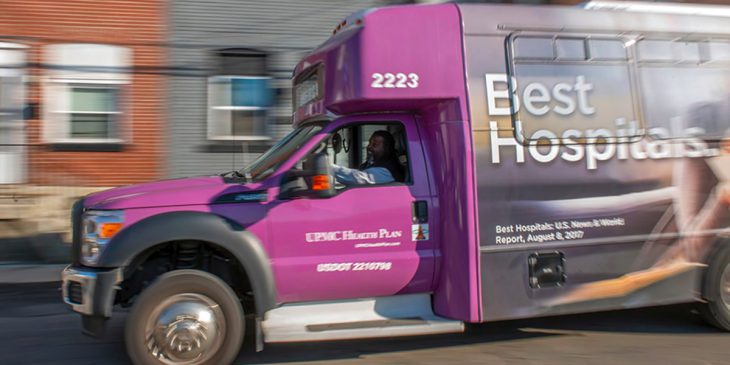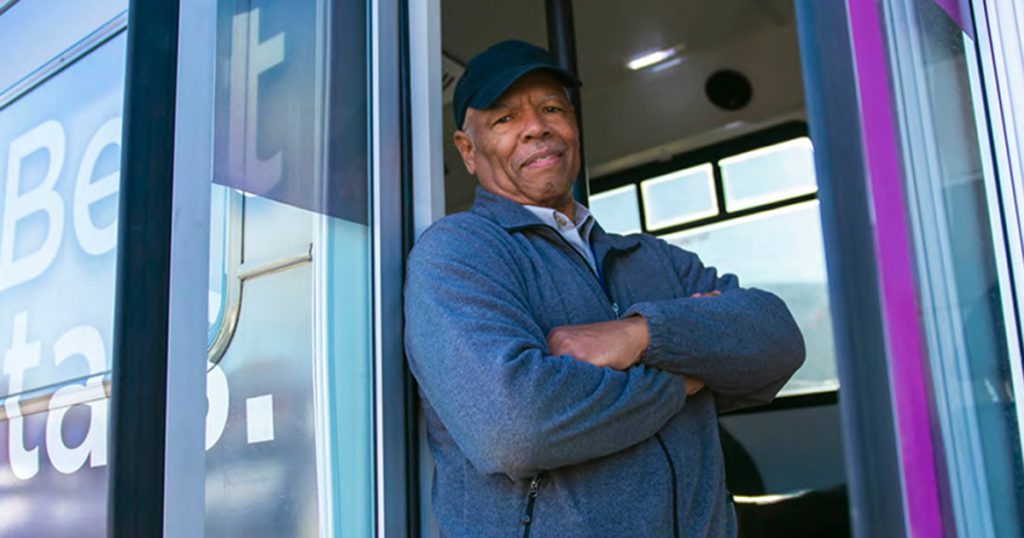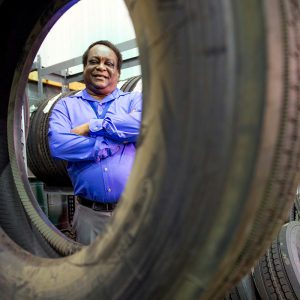Many people start their workday on a commute, often navigating through traffic, the challenges of weather and other drivers who may not have their eyes on the road.
From there, it’s off to the office, whether that’s the operating room, the kitchen, a cubicle, or the emergency department — places employees are likely to encounter stressful situations at a breakneck pace.
But, for many UPMC staffers at Pittsburgh-area hospitals, there’s a short respite in between the stress of the commute and the hustle and bustle of the workday — the quick Employee Transit shuttle from an offsite parking garage to the hospital doors.
“I notice that when passengers get off, they say, ‘This is the most pleasant part of my day,’” said Robert Thompson, shuttle operator on the lower Oakland route.
Drivers like Thompson, who has been part of the shuttle system since UPMC acquired his former company more than a decade ago, go to great lengths to make the ride more than a way for staff to get from point A to point B.
He is one of the dozens of drivers who navigate nearly 800 loops each day, getting staff from garages like South Lot and Second Avenue to hospitals like UPMC Mercy, UPMC Presbyterian and UPMC Magee-Womens Hospital. And, while they don’t often encounter patients directly, Thompson and his colleagues play a pivotal role in creating the UPMC Experience for employees.
The Shuttle Experience
It starts with the ambiance. Some drivers, like DeCarlo Gilliard, shuttle operator on the Mercy-Chatham Center Garage route, like to play music – tastefully and quietly.
As a driver, Gilliard noted, each driver’s own approach to his or her interactions with others can play a huge part in how passengers approach the rest of their workday.
“These are our peers,” he said of his passengers. “I think: ‘How would you like to start your day?’ When you start your day, you set yourself, then you set the tone for everyone else.”
Small talk is also welcome on his shuttle.
“I say ‘Good morning,’” Gilliard recounted, “and some of them say, ‘Good morning!’”
Sometimes the small talk can grow a bit bigger.
“We play a big role in those people’s lives, for those few minutes we spend with them,” Thompson said. “I can tell you about their life story, their families — we’re like a bartender. We take care of them.”
But, at the end of the day, it’s all about being on time.
“My biggest thing is the schedule,” Thompson said. “I like to hear, and they say it quite often: ‘Set your watch by him!’”
Gilliard agreed, adding that it’s all in the approach.
“I once was running late, and I pulled up to a stop and a woman got on and immediately said, ‘I’ve been waiting over 20 minutes for you! That doesn’t make any sense!’” he recalled. “And I said, ‘Well, thank you; I’ve never had a woman wait 20 minutes for me. I really appreciate that.’ And her whole mood changed like that. It turned the dial. She started laughing, everybody on the bus started laughing with her, and she sat down and enjoyed her ride.”
What Does It Take?
Knowing the streets and the hospitals is a given for UPMC shuttle operators, but there are more prerequisites to being a successful driver.
For one, drivers can’t get rattled easily. There’s traffic — and, as every driver knows, no one wants to sit behind a bus, so many take the liberty of cutting in front of it instead.
“You’ve got to be looking for that guy on the curb; you’ve got to be looking for that car coming the wrong way down a one-way street,” Gilliard said.
Drivers also must be ready to deal with the elements: A shuttle operator’s life might seem like a lot of sitting down, but there’s exposure to all kinds of weather before, during and after a shift.
And, there are those other incidents.
“Once, I was pulling away from a stop,” Thompson recalled. “I’d looked all around, didn’t see anybody. Then all of a sudden from behind me: ‘Boom! Boom! Boom!’ This guy was hitting the side of the bus with his briefcase. He came out of nowhere, had come running down the hill, and that scared me — if you hit the sides of those buses it’s loud!”
“Even though you’re dealing with our people, our employees, you have to be able to deal with the public,” Ted Hill, fleet transportation supervisor, added. “You’re coming into contact with the public, the patients, the visitors.”
Sometimes drivers encounter them in an even more meaningful way.
In December 2013, Thompson was on his route from South Lot to UPMC Presbyterian when he arrived to see a professional staff nurse — a woman he had seen before but didn’t know well — standing and waving her arms.
“The closer I got, I said, ‘What’s wrong with that woman? I’ve seen her before; she doesn’t act like that,’” Thompson recalled. “It was like she was losing control of her motor skills.”
He pulled up and asked the woman if she was all right. She told him she had just cleaned off her car, and she thought she felt OK.
He asked the nurse if she could board the bus and she said she could, but as she got to the top step, she became disoriented.
It turns out Thompson’s suspicions were correct: She was having a stroke. The woman recovered, and Thompson was honored the next year as a recipient of UPMC’s Award for Commitment and Excellence in Service, given to less than 1% of employees across the organization each year.
Looking for HOPE
Gilliard and Thompson both come from backgrounds in management and community involvement.
Gilliard, who lives in Pittsburgh’s Stanton Heights neighborhood, started a program about six years ago to help young men take control of their own lives and learn about the responsibility that comes with fatherhood.
“When God blew AIR into you, he blew ‘Accountability, Integrity and Responsibility,’” Gilliard said of the men he works with through his program. “That’s the thing that I teach them.”
What began as a six-month program with about a dozen men attending at his church has grown into an ongoing class that has graduated more than 80 men.
He is currently working on writing a book to further expand the curriculum he established so that it can be replicated elsewhere, and is establishing a clothing line called “GF,” which stands for “God First.”
While driving a bus full of hospital employees a half-mile from their parking garage to their workplace isn’t the same as running a ministry program, these two major parts of Gilliard’s life do have their similarities.
“That’s what I look at when I look at my passengers,” he said. “Everyone has a subject of learning. You’re learning something as you go through your day. I’ve found out a lot of things about my passengers.”
Those interested in a career as a shuttle bus operator at UPMC can search for opportunities here.











